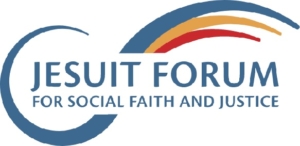OPEN SPACE
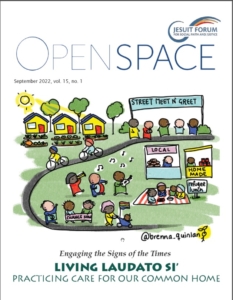
Living Laudato Si’ – Practicing Care for our Common Home
September 2022, Vol. 15, No. 1
Seven years ago, Pope Francis addressed all of Earth’s people in his ground-breaking encyclical, Laudato Si’: On Care for our Common Home.
Laudato Si’ calls us to an ecological conversion that encompasses individual, communal, and societal transformation rooted in a spirit of gratitude, generosity, care, and tenderness.
In this OpenSpace, we explore a variety of initiatives and practices that might stimulate your own reflections on how to care for our common home. If you are part of an organization, community, parish, or workplace, these examples might also inspire you to formulate a Laudato Si Action Plan to live out ecological conversion with others.
As you read, we invite you to reflect on what resonates with you: Where do you feel called to ecological conversion? What kinds of actions are you inspired to undertake to care for our common home, our beloved Earth?
PAST ISSUES
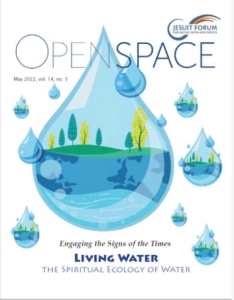
Living Water: The Spiritual Ecology of Water
On March 2. the Forum invited three guests to reflect with us on our relationship with water, what we might call “the spiritual ecology“ of water:
- Lina Azeez of Watershed Salmon Watch, which works to defend and rebuild BC’s wild salmon and their habitats.
- Jesse Cardinal of Keepers of the Water, a group of First Nations, Metis, Inuit, and local communities working to protect the water, air, land, and creatures of the Arctic Ocean drainage basin.
- Joanie McGuffin of the Lake Superior Watershed Conservancy, a land trust striving to sustain a healthy Lake Superior watershed.
Together, we spoke of how we are connected to water, how that connection is being endangered, and how our relationship with water might be renewed. With gratitude, we summarize their reflections here. As you read, we invite you to reflect on your own experiences of connection to water and how we might protect water for future generations.
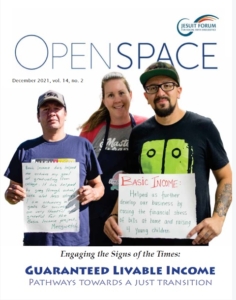
Guaranteed Livable Income: Pathways Towards a Just Transition
In this issue of OpenSpace, we invite you to reflect on ways that a Guaranteed Livable Income might enable countless people to live healthier, happier, and more dignified lives—potentially at little or no additional cost compared to existing social supports.
Questions are provided on the final page of this issue that can be used to spark meaningful conversations in communities you are part of. Hopefully, this will help many of you engage in work to support and advocate for a Guaranteed Livable Income in Canada.
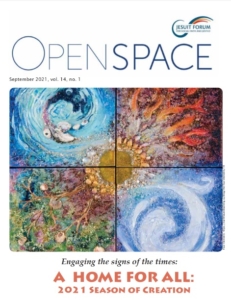
A Home for All: 2021 Season of Creation
In this OpenSpace, we invite you to reflect on “all our relations” via a meditation on the four traditional elements of earth, water, fire and air. As we explore these relationships please consider:
- How we are intimately connected with all life and the elements. In so doing, take time to experience gratitude for these connections, including our connection to the Creator of all.
- How humans – particularly the wealthiest among us – are currently threatening the integrity of creation, putting countless species at risk of extinction, destroying the artistry of our Creator, and endangering billions of human lives.
- Pathways towards a genuine ecological conversion, including actions to renew and regenerate our home household.
Each section begins with an invitation for you to take time to connect with earth, water, fire, and air using the elemental breaths practice originally taught by the Sufi teacher Hazrat Inayat Khan.
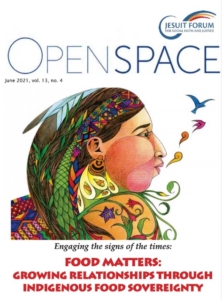
Food Matters: Growing Relationships through Indigenous Food Sovereignty
Food Sovereignty seeks to revalue, rebuild, learn from, and celebrate Indigenous food systems. In February 2021, the Jesuit Forum hosted a webinar with Dawn Morrison, Secwépemc founder of the Working Group on Indigenous Food Sovereignty (BC); Clifford Paul, Mi’kmaq Moose Management Coordinator at Unama’ki Institute of Natural Resources (NS); and Isaac Crosby, Chippewa Lead Hand in Urban Agriculture at Evergreen Toronto (ON).
This issue of OpenSpace, drawing on our conversation in February, celebrates the resurgence of Indigenous food systems and food sovereignty and how these teach us, once again, that another world is indeed possible—a world where we share what is needed, where traditional knowledge is valued, and where we ensure that all living beings can flourish and live well.
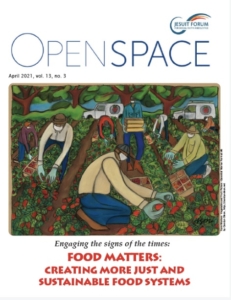
Food Matters: Creating More Just and Sustainable Food Systems
In this issue of OpenSpace we begin by reflecting on food—how it is produced, how the present system undermines ecological and human health, and why so many go without the food they need.
We then explore an alternative framework—food sovereignty—drawing on an online conversation we hosted in December 2020 between Leslie Campbell (an urban agronomist working with FoodShare Toronto) and Nettie Wiebe (an organic farmer, ethicist, and food activist from Delisle, Saskatchewan).
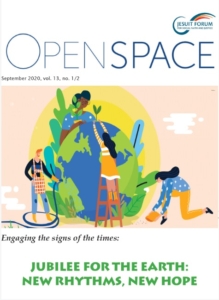
Jubilee for the Earth: New rhythms, New Hope
In this issue of Open Space, we draw on the reflections shared in three webinars held between May and June of this year (2020) to celebrate the fifth anniversary of Pope Francis’ encyclical, Laudato Si’: On Care for our Common Home. In the Hebrew tradition, Jubilee is a time for righting our relationships with others – to free those held in captivity, to let the Earth rest and regenerate, and to ensure a just distribution of the Creator’s gifts so that all may have the means to live and thrive. In different ways, the pieces reflect on the challenge of changing the way we relate to one another and the wider Earth community, calling us to a deep metanoia – a change of heart, an ecological conversion.

